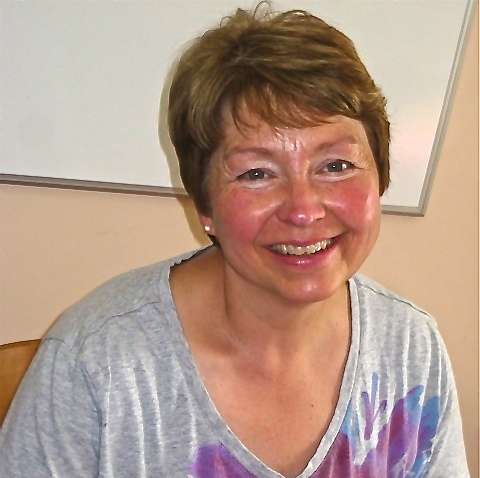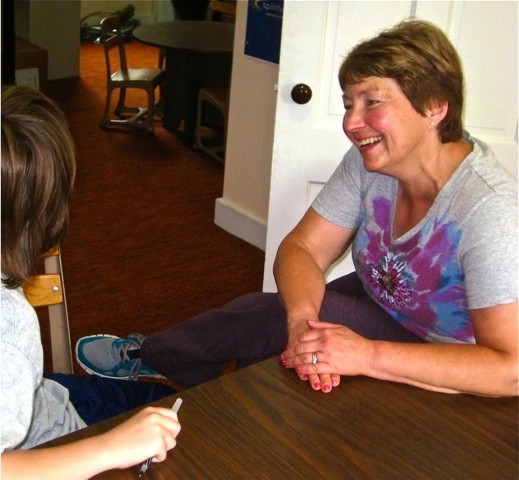
A woman over a hundred years old could not hear and wasn’t speaking. A little boy in the class discovered how to communicate with her. Her eyes lit up and she started communicating with my little boy. They were laughing. The residential people and the activities director were amazed. It was the most beautiful thing in the world.
1. What led you to the mission of being an elementary education teacher?
My love for children brought me into this mission. Even as a young person when I was babysitting, I loved doing projects or reading books with the children. My mother used to tell me, “Susan, you have such a great way with children. Maybe you’d like to be a teacher. Think how fabulous that would be. You’d work nine months out of the year and have your summers off. How perfect would that be?” I did become a teacher, but found out that summers haven’t been a vacation! I’m continually taking classes, improving, and growing. Teaching is a year round commitment.
I decided to get an elementary education degree so I could teach up to the eighth grade. I went to the University of Southern Maine at Gorham. The environment was a comfortable and nice fit. Since graduating, I’ve taught nursery school and up to eighth grade reading. Where I’m needed is where I have gone. The main point is that I just love working with children.
2. What does this mission mean to you?
It means love, unselfishness, dedication, and meaningful experiences learning with my children, learning about my children, and learning about their families. It really all comes down to love. I love my students – all of them, and love doing meaningful things with them.
For instance, we go on field trips and the kids take a learning log along. They might sketch, write, or list questions to ask a guest teacher who might later give a talk. Another thing we do is go to a nursery school and form reading buddies. My older kids pick books they are studying, practice reading them, and do role-playing on how to read to get younger kids into a book. They learn fluency and expression. Then they go sit with younger children and read to them. Afterwards they’ll do a book project that will hone in on its meaning or characters, or something about the book that they experienced together. This is so meaningful for everyone. They not only share their love for reading, but also get to know their buddies and learn how to read aloud to them.
is go to a nursery school and form reading buddies. My older kids pick books they are studying, practice reading them, and do role-playing on how to read to get younger kids into a book. They learn fluency and expression. Then they go sit with younger children and read to them. Afterwards they’ll do a book project that will hone in on its meaning or characters, or something about the book that they experienced together. This is so meaningful for everyone. They not only share their love for reading, but also get to know their buddies and learn how to read aloud to them.
We go to a health care facility and do service learning. The students interview the director, activities director, and older adult residents. They find out what they like and what they need. We go at certain times during the year when we can bring our Halloween costumes or decorate the Christmas tree. A woman over a hundred years old could not hear and wasn’t speaking. A little boy in the class discovered how to communicate with her. For the first time her eyes lit up and she started communicating with my little boy. They were laughing. The residential people and the activities director were amazed. It was the most beautiful thing in the world. That brought tears to our eyes. This child will never forget this experience.
Another older adult said, “We don’t ever see children. We just want you to come and bring some nature. We don’t get outside very often.” So my students brought pinecones, different kinds of leaves, flowers, and things from nature to share with them. What a joy it was to have experiences like this as a teacher and be in charge with older and younger ones learning together.
Last year I had two boys buddy up with this man who always wore a baseball cap. The last two times we went, this man did not show up, so my boys went to the activities director and said, “But where is he?” She said, “Well, I’m sorry boys, he just didn’t feel like coming today.” They boys said, “Oh but we need to see him. We planned for him. We really wanted to see him. Would it be OK if we went down to see him?” So the activities director led them down the hall to see him. The boys told the man, “But we want you to come.” He changed his mind and came out to the activities room with my students. It’s these kinds of days that make being a teacher so special and meaningful.
3. What was your best day as an elementary education teacher?
There are so many of them. I have about a twenty-minute ride going home from school each afternoon. I have time to think about the things that went well and the things that maybe didn’t go so well. I ask myself, “How can we make it better?” I often think how much I love to hear the children laughing – not so much silly laughing, but the laughter that comes from thinking, “Oh, my goodness, we love what we’re doing.” For instance, they might be researching something about lighthouses. They might find this great ghost story. A joyful student might say, “Oh my goodness everybody. Hold on! Listen to this!” Then the smiling student might share the whole story with the group.
I love it when kids are in to their learning. You can tell because they say, “Oh this is so much fun Mrs. Tripp! We love this Mrs. Tripp.” I had a boy who wrote an essay about the ridiculousness of reading. He liked to be outside running and playing and thought the purpose of reading was for naught. He didn’t think he was going to need reading. However, he got hooked on a reading series he just couldn’t put down. I asked him, “Oh do you remember when you wrote that essay about not wanting to read during silent reading time?” He said, “Oh I know. I can’t believe it!” He got it. He now loved reading books. Life doesn’t get better than that – when the light bulb goes on in a student. He really got what I was trying to explain – why he was learning to read. I love it when learning becomes fun.
I had a child last year and he was always late. He learned that if he didn’t get to school on time, he would not get to do some of the fun activities I had planned. So he decided to do whatever he could do to get to school on time. He didn’t want to miss what we were doing. I love to see the positive changes in the children. A child will come up and give me a hug – out of nowhere — and I know they are feeling good about being in the classroom and learning.
I have a little system and am known as the Post-it-Note queen. I have the children bring in Post-it-Notes at the beginning of the year. We use them for writing revisions or noting if they have questions, comments, or need to do a little sketch. If a student has something on their mind and I’m in the middle of something with students, they can write their idea on a Post-it-Note and stick it on my desk. At some point, I’m going to go to my desk and get something from it. Then I’ll notice that Post-it-Note. They can fold it up so it can be very private. The comment could be, “I had trouble with something out at recess,” “so and so is picking on me,” or “I’m feeling really sleepy today because of something that happened last night.” One of my favorites was from a little girl who was not confident about math. She wrote, “I need more practice. Could you help me?” After a lesson I can take that student out in the hall and work with her individually. It makes all the difference in the world and gives them an opportunity to share what they are happy or concerned about. It alerts me to the fact that I need to talk one to one with them to take the pressure off them.
4. What was your worst day as an elementary education teacher?
If you have had something challenging at home, it has to disappear while you are at school. The classroom is all about those kids and so the worst day would never be about myself. The worst day would be about something that happened with a child. What would be difficult for me is going home at night and thinking about a child who was really sad.
I also feel bad when a child gets in trouble and does something like picking a fight at recess and getting in trouble with another teacher. I often find there are other things going on in their lives like feeling really bad about something else, or thinking somebody has disappointed them. That’s the kind of thing that is really hard for me.
5. How did you survive your worst day?
I start looking for good in the classroom. I start complimenting the children in meaningful ways and tell them something special or good that they doing. I might bring the whole class together for a “read aloud”, and read a portion of the book. I love their comments such as, “Oh no she’s in trouble now!” Then I know they are with me. What’s fun is to bring everybody together on the same page.
If we have a really huge challenge, we’ll have a class meeting and talk it out. But we always end it by asking, “How can we make this better? What are some steps that we can take?” We come up with a positive, productive plan.
Powwows work well too. If something isn’t going well, we use the term, POW, meaning we need to POW something to get rid if it. We discuss, “How are we going to that?” Then we talk about the WOW. This is what is really good about our day. In this way we end the day and acknowledge that even if things didn’t go right, we’re going to POW out the things that aren’t working and WOW in the things that will improve the situation. POW are the things to get rid of and WOW are the wonderful things to keep.
We also make a T-Chart. On the left side we might write things we are doing well and on the right side put things we need to work on. Sometimes we will do this with Post-it-Notes and just add them to the board. I can also do this to include me and answer the question, “What can I do to be a better teacher?”
- « Previous person: Mary Massey
- » Next person: Alison Dreith